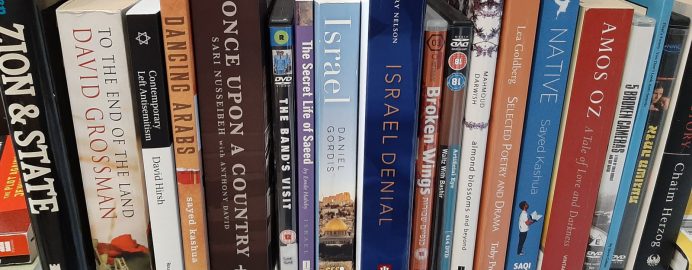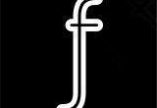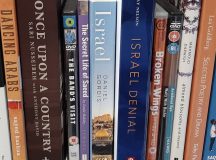Each fortnight Fathom writers have been recommending Israel-related books, films or podcasts to help our readers through the lockdown. This fortnight, the selections of Einat Wilf, Matti Friedman, Koby Huberman, Robin Moss and Lyn Julius. Read previous recommendations here, here, here, here here and here.
Matti Friedman recommends Ari Folman’s film Waltz With Bashir
One unexpected effect of the Corona shutdown in Israel has been a resurgence of memory from one of the most important and least understood periods in the country’s history – the 18-year war in Lebanon, an amorphous conflict beginning with the invasion of June 1982 and ending with the pullout of May 2000.
This spring, after two decades of repression and willing forgetfulness, a combination of quarantine boredom, excessive screen time, and middle-aged introspection led to the remarkable emergence of a closed Facebook group, ‘Stories from Lebanon,’ that began with a few veterans and has swelled to more than 32,000 – war stories, old photos, online reunions, a kind of group therapy session that got out of hand. The mainstream media has covered the phenomenon, and one of Israel’s formative periods is suddenly out of the closet. It has been fascinating to watch.
These developments make it the perfect moment to return to one of Israel’s best movies: Ari Folman’s Waltz With Bashir. Folman’s masterpiece from 2008 is an animated documentary about the director’s pursuit of his own slippery memories as a young foot-soldier in Lebanon; a look at friendship and trauma, both personal and national; and an investigation into why we remember what we remember. From the startling opening scene, in which precisely 26 ferocious dogs pursue a guy named Boaz in a dream, to the end in the southern suburbs of Beirut, and through hallucinatory and searing scenes in between, the film manages to seem more real than any news footage. Waltz With Bashir offers a glimpse into an important corner of the Israeli psyche, and is one of the best war movies ever made.
Matti Friedman is the author of Pumpkinflowers: A Soldier’s Story of a Forgotten War, about his experience as a soldier in Lebanon. His most recent book is Spies of No Country.
*
Einat Wilf recommends Gil Troy’s The Zionist Ideas: Visions for the Jewish Homeland – Then, Now, Tomorrow.
If you think the Jewish people are experiencing a moment of highly divisive politics, you have not yet read Gil Troy’s monumental collection The Zionist Ideas: Visions for the Jewish Homeland – Then, Now, Tomorrow. Troy’s book, a carefully curated anthology of Jewish thought, introduced by Troy himself, is an exercise in the art of Jewish argumentation. To read through the sections of the book is to realise how old and heated is the debate about ‘the Jewish Homeland’ and how varied are the visions that sustain it.
Through the prism of a broad array of thinkers, writers, and artists who have imagined the state of Israel, wrote about it, advocated for it, and laid out its cultural foundations, the story of the birth of the State of Israel emerges as one accompanied by constant bickering, argumentation, and extreme forms of ‘cancel culture’ by which members of family refuse to speak to each other, and members of rival camps actively believe that the other is no less than the anti-Christ, so to speak.
As the loud arguments between various forms of Zionism jump from the pages, one cannot but help develop a somewhat optimistic and even bemused attitude in reviewing today’s far more tame debates, in comparison. From the vantage of historical distance, it is clear that almost all participants in the fierce debates on Zionism had a point, and Zionism was better off for their debates. One could only assume then that the same would be true today.
Troy’s book is always an excellent companion, but especially during these homebound days, one could always open it to read one short excerpt or an entire chapter and consider oneself lucky that all those argumentative Jews ultimately pulled together and create a state – where and about which they can happily keep arguing…
Einat Wilf is the co-author with Adi Schwartz of The War of Return. How Western Indulgence of the Palestinian Dream Has Obstructed the Path to Peace.
*
Koby Huberman recommends Benny Morris’ 1948: A History of the First Arab-Israeli War and Yoram Kanyuk’s Tashah – תש“ח
I would recommend two similar books, which I read one after the other, as if they were two hemispheres of the same story. The first is Benny Morris’ 1948: A History of the First Arab-Israeli War. The second is Yoram Kanyuk’s Tashah – תש“ח – Yoram’s account of 1948 as a soldier.
Morris’ book is an eye opener and a very thorough analysis of the Independence War. I admit that initially I was concerned about the book coming from Prof. Morris, as I was worried about a ‘post Zionist’ account of the events. I quickly realised that I was wrong. The book helped me understand the background for 1948 and the chain of events in a way no other history book was able to do. The clarity, accuracy and the history-telling are exceptional. If you need to read one book about 1948 – this is the one.
Kanyuk’s book is the ‘other side’ – seen and written by a soldier, who fought in ‘48 in the toughest battles over the road to Jerusalem. Kanyuk is not a historian, he is a story teller. It is a profound account of what happens to the body and soul of a soldier, fighting for Independence and self-determination. For me, this book was unique from another angle – my Father fought shoulder to shoulder with Kanyuk at the same Palmach Harel Brigade, in the same battles. My father, who never spoke about his own experiences, gave me the book, and this is how I understood what he was going through. If you need to read one book about the generation that gave Israel its independence – this is the one.
Koby Huberman is co-founder of the Israeli Peace Initiative.
*
Robin Moss recommends #IsraeliJudaism: Portrait of a Cultural Revolution by Shmuel Rosner and Camil Fuchs
It has become common in the past few years to discuss Israeli society by reference to President Rivlin’s famous ‘Four Tribes’ speech to the Herzliya Conference in 2015. Whilst that paradigm, centred predominantly around the impact that Israel’s separate schooling streams has on creating an emerging ‘majority minority’ sectoral structure, is illuminating, I found this book’s analytical framework even more arresting.
Based on an enormous research project involving surveying 3,500 Israeli Jews, they propose a new way to understand Jewish-Israeli society (note that the book has little to say about Israel’s Arab minority). They suggest that a new, uniquely Israeli and deeply Jewish culture has not only developed in Israel but is now in fact the majority Judaism of Jews in Israel.
It is a Judaism that is traditional without being halachically observant; nationalistic without being simply a worship of civil symbolism; liberal in the sense of being driven by a ‘free market’ of ideas and practices more so than any top-down imposition; and vibrantly pluralistic but not on the American or British Jewish ‘synagogue denominations’ model. It is in a sense a post-ideological Judaism, and in another sense a profoundly Zionist Judaism. Or, to put it differently, it is a Judaism that would have equally bemused Herzl, Ahad Ha’am, Rav Kook and Jabotinsky!
It is a Judaism of Friday night dinners, cycling on Yom Kippur, flag-flying on Yom HaAtzmaut, grumbling at the Chief Rabbinate and a Judaism that is simultaneously much more secular and much more religious than a generation or two ago. Confused or intrigued by this paradox? Go and read the book (the English translation is thoroughly readable). It will enhance your understanding of Israel, its Jews and their Judaism.
Robin Moss is Director of Strategy at United Jewish Israel Appeal (UJIA).
*
Lyn Julius recommends Albert Memmi’s essay ‘Who is an Arab Jew?’
Albert Memmi was best known for his writings on colonialism and post-colonialism in France. He sadly died a few days ago, at 98, and was one of the few Jewish intellectuals born in Arab countries to explain the tragedy of the Jewish exodus from Arab lands.
An obscure essay he wrote in 1975, ‘Who is an Arab Jew?’ says it all with forensic clarity. ‘We would have liked to be Arab Jews: if we abandoned the idea it is because, over the centuries, the Moslem Arabs systematically prevented its realisation by their contempt and cruelty.’
Growing up in a poor family in the Tunisian ghetto, Memmi was keenly aware that Jews were a minority in a hostile environment.
This essay is one I like to come back to again and again, because the story of the experience of Jews in Arab countries has been bedevilled by denial and distortion. Memmi dissects several myths: that Jewish life is Arab lands was idyllic; that Zionism was the invention of Jews from Europe; that antisemitism in Christian lands was worse.
At a time when Zionism is being branded as colonialism, what is so remarkable is that Memmi has impeccable credentials as a fighter for Tunisian independence and a defender of anti-colonialism. But unlike so many academics and intellectuals, he has drawn the necessary conclusions: Arabs were historically oppressed, but that does not mean that they were incapable of oppressing Jews and other minorities.
Memmi goes further, with a ringing endorsement of Zionism: ‘If one were to base oneself on this legitimacy, and not on force and numbers, then we have the same rights to our share in these lands – neither more nor less – than the Arab Moslems.’
Memmi’s is a rare voice in the wilderness at a time when progressive opinion (including many Jews) has, in his words, ‘minimised the tragedy of Jews from Arab lands and helped to confuse people’.
Read Memmi’s essay at http://www.sullivan-county.com/x/aj1.htm
Lyn Julius is author of Uprooted: How 3000 Years of Jewish Civilization in the Arab World Vanished Overnight (Vallentine Mitchell, 2018)
Fathom hopes to publish a tribute to Memmi in a forthcoming issue.


































